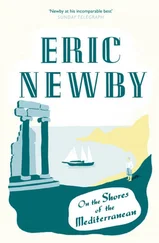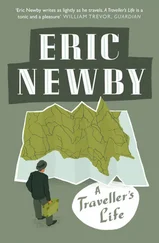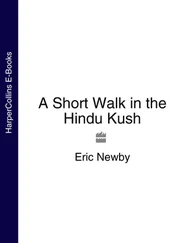Nevertheless, twelve years after its commencement the Ganges was finally admitted into the canal at Hardwar in April 1854. It was still some time before it was finally finished but when it was it watered the whole tract between the Jumna and the Ganges, bestriding it like a colossus extending to Etawah on the Jumna, and to Kanpur on the Ganges 350 miles downstream. By the eighties it had been extended as far as Allahabad and the irrigation of the Doab was complete. Its completion marked the end of serious famine in the region.
There was only one person to ask the way from, an old man sitting alone on the shingle, but he was not very helpful. ‘I don’t know where I am,’ he said. ‘Nor have I heard of the Banganga.’
It was Karam Chand who discovered the proper channel; rather he divined which was the correct one.
‘Sahib,’ he said. ‘This is the way of Ganga.’ None of us believed him; but fortunately we decided to take his advice.
Once more we started our miserable excavations and once more, having reached the head of the fall, we tipped over it and roared downhill watched by the old man, the solitary spectator, who had moved down to the foot of it and was squatting there, happily anticipating disaster, in much the same way as an inhabitant of an outer suburb who takes his ease on a bench at a dangerous corner on a warm August afternoon.
But this was only the beginning. At the bottom there was yet another fork. Here, however, the choice was a simple one. A prolonged reconnaissance showed that the two streams joined again a mile lower down. It was only a question of which was the least disagreeable. The one on the right had four separate waterfalls; the one on the left had three. The difficulty lay in the approaches. There was not enough water in either to float a cork, let alone a twenty-five-foot boat, drawing eighteen inches of water, and it lay on the stones as incongruous as a rowing-boat on a gravel drive after a sharp shower of rain.
Far away to the right, four men appeared and began to fish using weighted nets. G. set off to interview them. We saw him flourishing one of his swagger-sticks at them; then we saw them turn their backs on him and take up their nets and make off.
‘These men are not knowing anything,’ he said when he returned. ‘And, what is more, they are not helping us.’
‘You might have got some fish,’ I said – tempers were becoming frayed.
‘They were catching fish,’ G. said sadly. ‘They were catching Rahu but they were not giving me any.’
The boatmen set off in search of a village, a temporary place inhabited only during the dry season, which the fishermen had told G. existed not far off, where they hoped to buy food and get help. We waited for them to return and time, which we were in the process of learning to disregard, ceased to have any meaning at all. A black and white pied kingfisher with a beak shaped like the pick of an ice-axe and equally deadly, hovered motionless over what little water there was. Occasionally it hurled itself into it with its wings tight against its body, emerging with something which might have been a small fish or a tadpole which it walloped savagely on a stone in order to make it more digestible, before swallowing it. High overhead bar-headed geese flew purposefully in long, undulating ribbons wing-tip-to-wing-tip on their way to some distant feeding-ground.
Eventually the boatmen returned. Although they had phrased it differently the villagers had given the same reply to their requests for assistance that the fishermen had given to G.
‘We spoke to them for some time,’ said Karam Chand. ‘Huzoor, all that they would say was that their work was not with water.’
Both he and the others had also failed to get any food; whether by accident or design it was impossible to say.
We removed all the baggage from the boat and stripped it of everything we could; the rudder, the oars, the bottom gratings, and the stretchers. Without all these things it was still immovable. Our only hope lay in recruiting extra help but there was no one to give it.
We started to carry the gear a mile downstream to the place where the falls ended, through wastes of sand and stones that were now so hot that it was impossible to remain standing on them barefooted without dancing up and down. Bent under the weight of tin chests, oars and gratings, with hurricane lanterns held improbably in the crooks of our arms, we resembled the survivors of a shipwreck on the coast of Namaqualand, all except Wanda who, wearing a bathing costume of Helanca yarn, high wellington boots and her General’s hat on top of which she balanced a tin full of kerosene, was a fantastic figure, more like a drum-majorette in some Middle Western town than a memsahib on a serious excursion, and the boatmen regarded her with awe.
Suddenly, by the kind of miracle which all true travellers regard as inevitable and almost unworthy of remark, three men appeared. They were on their way to cut wood in the jungle, but when we asked them for help they said, as the others had, that their work was not with water. Nevertheless we pressed them into our service at a colossal wage of two rupees a head and although they were poor, emaciated, gentle creatures, with their unwilling help the boat began to move over the stones, making a noise like an old tram.
But it was only for a short while. At first the air resounded with encouraging cries. ‘ Challo! ’ (Oh, move!); ‘ Shabash! ’ (Well done!); ‘ Aur thora! ’ (A little more!) but in the face of the almost overwhelming difficulty of the operation, the noises soon died away and our efforts were concerted by a succession of unintelligible grunts. I could think of nothing but my bare feet, which, as I pressed them down on one rounded stone after another, felt as if they had been bastinadoed. I only possessed two pairs of shoes, one for social occasions and one for walking. The size and shape of my feet made it certain that, unless I was able to remain in one place long enough to have them made-to-measure, I would never find another pair however long I remained in India. I was very reluctant to ruin my shoes by using them underwater, but in the course of the next hour I was forced to put them on, for it took an hour to get the boat to the top of the fall. Even then it was not just a question of leaping into it or holding the gunwales and careering down as it had been previously. The water was too shallow. It was not until the boat was part way down the second rapid that it suddenly floated. It now gained such a momentum that it shot right through a large pool, over the top of the third fall and down it into a beautiful open reach. We had managed to transport some of the gear from the boat this far, but the rest was spread out in small dumps over a mile of beach, dropped at the whim of whoever had been carrying it, and while Wanda boiled the kettle for tea we went back to retrieve it.
We drank our tea and set off again. We were very tired. It was a beautiful river; but it was destroying us. Almost at once we heard the sound of more rapids. To our diseased imaginations they sounded like the Victoria Falls. We were hungry now. It was three o’clock. Since breakfast, a thin meal, we had eaten nothing except some hot, white radishes that Wanda had produced artfully from a mysterious-looking bag. Now she began to cook in a space which she cleared for herself in the bottom of the boat and when we finally came to the next rapids she refused to be off-loaded and separated from the stove. ‘If I stop cooking now we’ll never eat,’ she mumbled doggedly.
But this time there was no need for any of us to get out. There was a superabundance of water in these rapids and we went down at a terrific rate, clasping the seething cooking pots as if they were sacred relics. Safe at last we stopped to eat alongside an island that rose steeply out of the river. The water had cut away the banks, exposing stratas of smooth oval stones embedded layer on layer in the silt, like the flint wall of an old English house. The island was thickly wooded with shisham trees whose trunks and lower branches were closely wrapped with band upon band of coarse grass brought down by the flood waters and bleached white by the sun. It gave them a strange surrealistic appearance as if they had been bandaged. It was a sinister place; even the sandbanks in the river which had now begun to supplant the shingle seemed to float on its surface, and although I tried to rid myself of the image they reminded me of the bodies of long-dead, bloated animals that had lost their hair.
Читать дальше












